Aluminium die casting future development trends includes increased demand for lightweight and high-strength materials, technological innovation and process optimization and so on.
Aluminum die casting is an efficient and precise manufacturing process. Its core advantage lies in the mass production of complex thin-walled parts, which are lightweight, high-strength and sustainable. Its technical challenges (such as pore control) have been effectively alleviated by vacuum assistance and simulation technology, and its applications are in the automotive, electronics and industrial fields. The mold cost is relatively high, but the unit cost decreases significantly with the increase in output, which is suitable for large-scale production.
The future of aluminum die casting will be developed in three dimensions: “lightweight core”, “intelligent production” and “green transformation”. It will mainly reflect in the following aspects:
- Increased demand for lightweight and high-strength materials
- Technological innovation and process optimization
- Sustainable development and environmental protection
- Growth in market demand
- Challenges and Opportunities
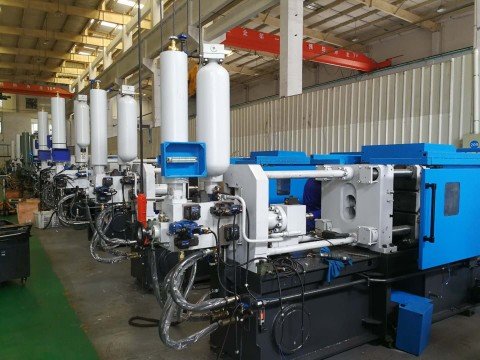
Aluminium die casting future development trends: Increased demand for lightweight and high-strength materials
- The automotive industry leads the demand
- Aerospace and defense upgrades
- Expansion of consumer electronics and industrial equipment
- Sustainable transformation of the construction industry
As the automotive industry moves towards electrification and lightweighting, aluminum die casting increasingly use in automotive parts. The aluminum die castings widely use not only in engine components, transmission systems but also structural components of electric vehicles. Due to their high strength and lightweight properties.
The automotive industry leads the demand
The popularity of new energy vehicles (especially electric vehicles) is the core driving force. Aluminum die-casting parts help automakers meet strict fuel efficiency and emission standards by reducing the weight of the vehicle body (such as Tesla’s one-piece die-casting technology can reduce weight by 10% and increase battery life by 14%).
High-strength aluminum alloys are widely used in key components such as electric vehicle battery brackets and motor housings to balance the weight gain of batteries and improve structural stability.
Aerospace and defense upgrades
- Aircraft components, missile systems, etc. need to balance lightweight and high strength. Aluminum-magnesium alloys are the first choice due to their excellent strength-to-weight ratio and corrosion resistance.
Military equipment (such as portable field equipment) also relies on the lightweight and durability of aluminum die castings.
Expansion of consumer electronics and industrial equipment
- The trend of miniaturization of electronic products requires precision heat dissipation components (such as aluminum-copper alloy heat sinks) and thin and light housings.
- Engineering machinery and communication equipment (such as 5G base stations) use die castings to achieve lightweight structure and high reliability.
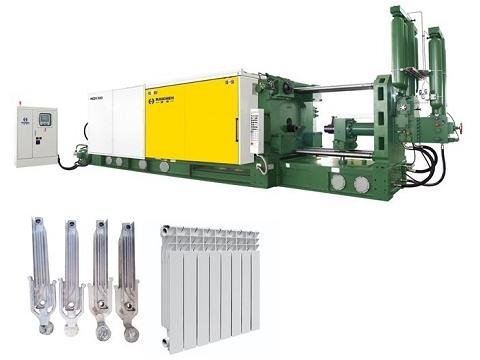
Haichen has established a prominent force in the die-casting industry, renowned for providing technologically advanced solutions. Specializing in both hot and cold chamber die-casting machines. For examples, pupular with aluminum pan die casting, aluminium radiator die casting, zinc medal die casting, zinc pipe couping die casting and so on.
Haichen die casting technique is engineered for high precision, exceptional reliability, and superior efficiency in producing complex metal components. By integrating innovative features and intelligent control systems, they achieve enhanced productivity and reduced operating costs. Committed to performance and durability, Haichen Machinery is the trusted partner for you seeking to excel in the competitive and demanding field of die-casting production.
Sustainable transformation of the construction industry
The demand for energy-saving buildings drives the application of aluminum die-casting in doors, windows, and curtain wall systems, taking advantage of its thermal conductivity, weather resistance, and recyclability.
The demand for aluminum die castings in the aviation field is also growing, because aluminum die castings can withstand large stresses and temperature changes, and have excellent fatigue strength and corrosion resistance.
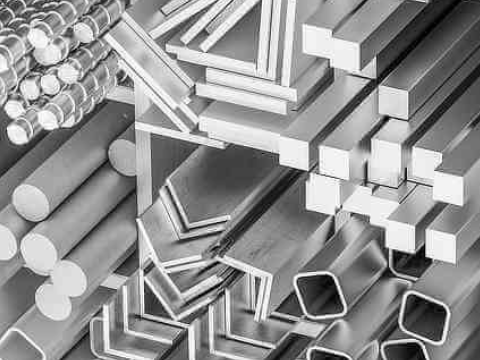
Aluminium die casting future development trends: Technological innovation and process optimization
- Large-scale and integrated die-casting of structural parts-Technology-driven
- Material and process optimization
- Intelligent and digital manufacturing
- Automation upgrade
In the future, aluminum die-casting technology will continue to develop in the direction of automation and intelligence.
For example, the use of computer-aided design (CAD), simulation and modeling tools, and artificial intelligence (AI) to optimize production processes can significantly improve production efficiency and reduce defects.
Large-scale and integrated die-casting of structural parts-Technology-driven
The demand for lightweight new energy vehicles promotes the integrated die-casting of large structural parts (such as battery trays and body chassis), reducing the number of parts and improving structural strength.
Material and process optimization
- High vacuum die casting (vacuum degree <10 kPa) reduces pores, making castings weldable and heat-treated (T6), and expanding to safety structural parts.
- Develop low-alloyed, high-strength and tough aluminum alloys (such as Al-Si-Mg-Mn) to meet the mechanical performance requirements of thin-walled (<2mm) large parts.
Intelligent and digital manufacturing
AI optimizes process parameters (injection speed, temperature), monitors defects (such as pores, cold shut) in real time, and improves yield.
Automation upgrade
Robotic fully automatic die-casting units (such as Meltec aluminum liquid dosing system) achieve high-precision casting and post-processing, reducing manual intervention.
In addition, the application of new processes such as low-pressure casting and gravity sand casting has further improved the quality and performance of aluminum die-casting parts.
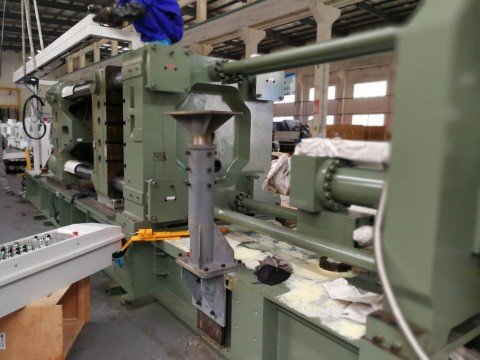
Sustainable development and environmental protection
- Material recyclability and circular economy
- Lightweight drives energy efficiency improvement
The aluminum die casting industry is gradually turning to more environmentally friendly production methods.
For example, the melting aluminum-free technology reduces energy consumption and carbon emissions; the use of recycled aluminum as raw materials not only reduces costs but also reduces waste. These innovative measures are in line with the global trend of sustainable development.
Material recyclability and circular economy
The core advantage of aluminum alloys is their 100% recyclability and low energy consumption. Using secondary aluminum alloys (recycled aluminum) can significantly reduce energy consumption (about 95% energy saving compared to primary aluminum production) and carbon emissions, which is in line with the principles of circular economy.
Lightweight drives energy efficiency improvement
The automotive field is the core application scenario: aluminum alloy die-castings can replace steel parts, reducing weight by 50%, directly reducing fuel consumption of fuel vehicles (saving 1.8 liters per 100 kilometers) or increasing the range of electric vehicles.

Growth in market demand
The global aluminum die casting market expectes to grow at a compound annual growth rate (CAGR) of 5.6% to 6.4% between 2023 and 2032. This growth mainly drives by demand from the automotive, aerospace, consumer electronics and construction industries. In particularly, the market outlook is particularly optimistic in the Asia-Pacific region due to the rapid development of emerging economies such as China.
Challenges and Opportunities
- Intelligent and green manufacturing
- Potential challenges cost and capacity barriers
Although the aluminum die-casting industry has broad prospects, it also faces some challenges. Such as fluctuations in raw material prices, fierce market competition, and strict environmental regulations. However, these problems expect gradually resolved through technological innovation and optimization of production processes.
Intelligent and green manufacturing
- Industrial Internet + big data optimizes production processes, and robot automation improves efficiency.
- Green technology: application of recycled aluminum, energy-saving process (vacuum/semi-solid die casting) to reduce carbon emissions.
Potential challenges cost and capacity barriers
- High investment in high-pressure die-casting equipment (complex steel molds) and financial pressure on small and medium-sized enterprises.
- Energy-intensive production is affected by electricity price fluctuations.
Thus, the future development of aluminum die-casting technology will focus on lightweight, high strength, intelligence and sustainable development. With the growth of market demand and technological advancement, aluminum die-casting will play an increasingly important role in multiple industries and become an indispensable part of the manufacturing industry.
Haichen die casting machine
Haichen is one Chinese die casting machine manufacturer for more than 10years. We produce both high pressure cold chamber die casting machine and hot chamber die casting machine.They have durable and highly precise features.
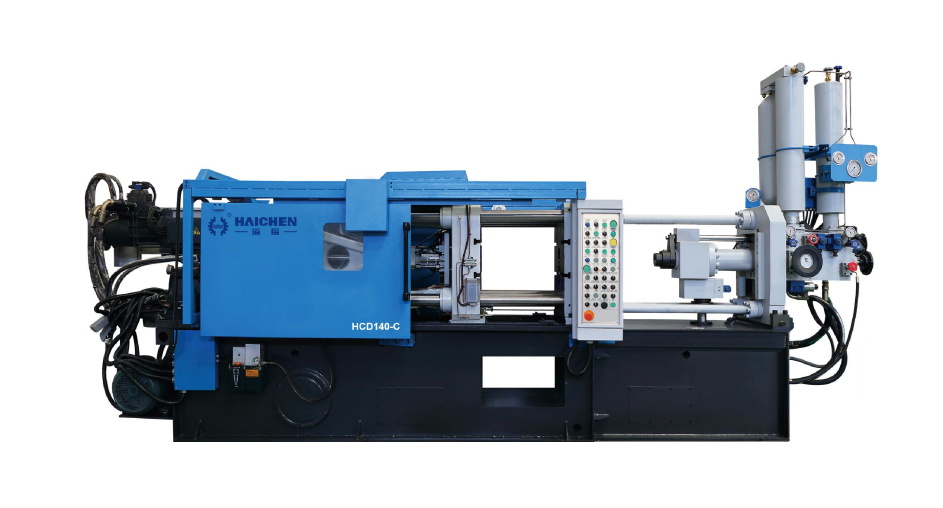
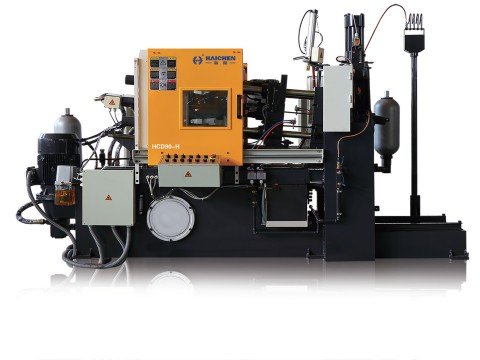
Haichen also produce die casting machine auxiliary equipment. Such as conveyor, vacuum machine, mold temperature controller, industrial robot, sprayer and so on.
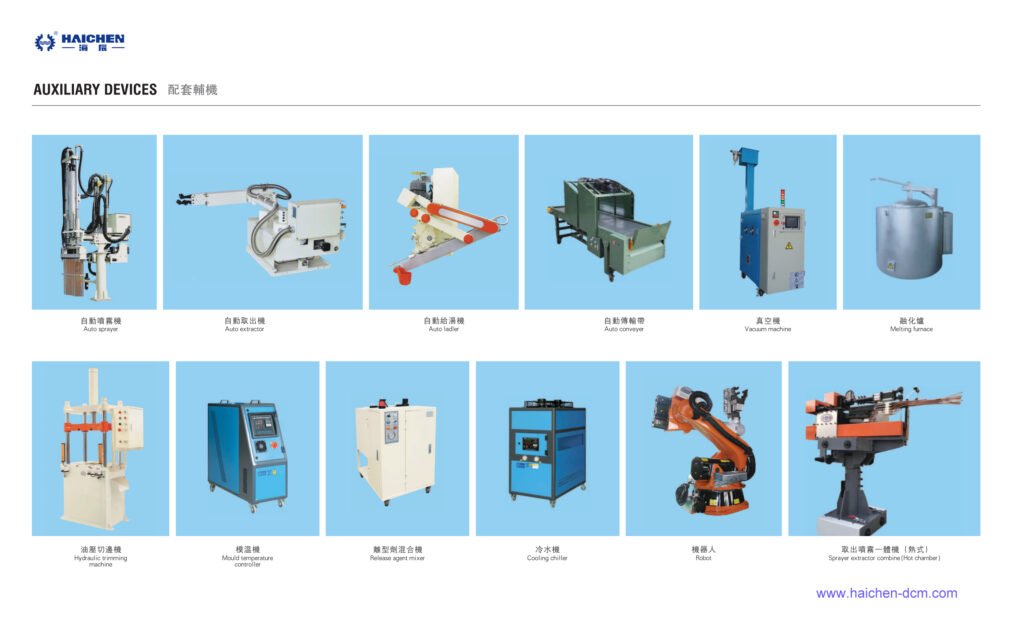
We supply cold chamber and hot chamber die casting machine spare parts.
When you have any demand, feel free to contact us.



